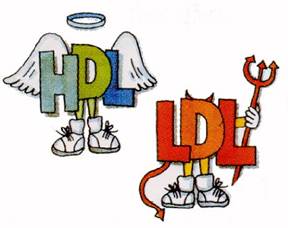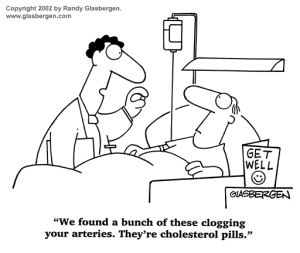Have you been given the bad news lately from your doctor? According to a recent blood test, you have high cholesterol. You might not even be experiencing any noticeable symptoms, but you’ve seen the drug commercials and you know that having high cholesterol isn’t a good thing. But are taking drugs the only solution to high cholesterol?
Frist of all what is cholesterol and why is it found in the body?
Cholesterol is a fat-like substance that is made in the liver and has a lot of important roles in the body. The liver will produce less cholesterol when we eat cholesterol-rich foods and will produce more when we eat foods without cholesterol. 75% of the cholesterol in your body is made by the liver and 25% comes from the food you eat. Cholesterol is necessary to produce vitamin D, steroid hormones, and bile acids. It’s also a component of cell membranes. So far you might be saying “cholesterol doesn’t seem like such a bad thing” and you are right! We need cholesterol so much that our body actually makes it. In fact, higher cholesterol levels might be associated with greater muscle growth because it is the precursor to important anabolic hormones that are related to muscle growth/repair (this is important to most of us, especially athletes). Cholesterol is also the basis for other reproductive hormones such as other androgens and estrogens (sex hormones). The problem with cholesterol is if the levels in our blood get extremely high or if the ratios of high-density lipoprotein (HDL) to cholesterol get too low.
What is a HDL?
 Cholesterol is fatty and doesn’t mix well with blood, so it travels in our blood via a protein “wrapper” known as a lipoprotein. We often hear about HDL and LDL cholesterol — these actually aren’t “cholesterols” per se but rather the protein “wrappers” that transport the cholesterol.
Cholesterol is fatty and doesn’t mix well with blood, so it travels in our blood via a protein “wrapper” known as a lipoprotein. We often hear about HDL and LDL cholesterol — these actually aren’t “cholesterols” per se but rather the protein “wrappers” that transport the cholesterol.
HDL (high-density lipoprotein) aka “good cholesterol”, mops up excess cholesterol and brings it to the liver for disposal, helping prevent heart disease.
LDL (low-density lipoprotein) aka “bad cholesterol”, also has an important job as it transports cholesterol and fat from the liver to the rest of the body. LDL’s may build up in your arteries and form plaque. Plaque narrows your arteries and may develop into a clot which may cause a heart attack or stroke. There are also very low-density lipoproteins (VLDLs).
Triglycerides – Another type of fat in the bloodstream, triglycerides are also linked to heart disease and diabetes. They are stored in fat cells throughout the body. Usually, you want these to be lower.
What do I need to know about my cholesterol blood tests?
- If you are over 20 years old, have your blood cholesterol levels evaluated once every 5 years.
- focus more on HDL/total cholesterol & triglyceride/HDL ratios instead of total cholesterol.
- HDL/total cholesterol ratio should be greater than 24% (example total cholesterol of 210 mg/dl and HDL of 55 mg/dl gives a ratio of 26%)
- triglycerides/HDL ratio should be below 2 (example triglycerides of 100 mg/dl and HDL of 55 mg/dl gives a ratio of 1.8)
I have high cholesterol, should I take Statin drugs?
 Statin drugs and other blood cholesterol lowering chemicals are often seen as a quick fix. Yet these drugs can come with side effects like memory loss, difficulty concentrating, lowered exercise tolerance, muscle pain, increased cancer risk, diabetes and depression — which, ironically, make it pretty tough to prioritize lifestyle changes that could turn your health around. Regardless, one in four Americans age 45 and older are taking these drugs hoping to reduce their risk of heart disease. If you want to avoid these drugs (or reduce the amount of time you’re on them), try using the following natural treatments for high cholesterol.
Statin drugs and other blood cholesterol lowering chemicals are often seen as a quick fix. Yet these drugs can come with side effects like memory loss, difficulty concentrating, lowered exercise tolerance, muscle pain, increased cancer risk, diabetes and depression — which, ironically, make it pretty tough to prioritize lifestyle changes that could turn your health around. Regardless, one in four Americans age 45 and older are taking these drugs hoping to reduce their risk of heart disease. If you want to avoid these drugs (or reduce the amount of time you’re on them), try using the following natural treatments for high cholesterol.
Natural Treatments for High Cholesterol:
- Eat at least 7 servings of vegetables & 3 servings of fruit every day. There are countless substances in food that have cholesterol lowering properties. Many are found in vegetables and fruits.
- Eat at least 1 cup of legumes (peas, beans, lentils) every day. Legumes are fiber rich and binds to cholesterol in the digestive tract.
- Eat at least 1/3 cup or raw nuts or seeds every day.
- Get plenty of high quality, omega-3 fats, such as algae (spirulina) or fish oil, and reduce your consumption of damaged omega-6 fats (trans fats, vegetable oils) to balance out your omega-3 to omega-6 ratio.
- Include heart-healthy foods in your diet, such as olive oil, coconut and coconut oil, organic eggs, avocados and organic grass-fed meats (avoid factory-raised meats).
- Eat plenty of herbs and spices. This includes ginger, garlic, and curcumin. Ginger can increase circulation and curcumin can block cholesterol uptake in the gut.
- Drink caffeine-free tea every day. Tea can help to lower blood cholesterol, reduce arterial plaque, improve blood vessel function, and decrease lipid oxidation. Caffeine can increase cholesterol levels by nearly 10%.
- Eliminate grains and fructose from your diet. This is one of the best ways to optimize your insulin levels, which will have a positive effect on not just your cholesterol, but also reduces your risk of diabetes and heart disease, and most other chronic disease.
- Make sure to consume a good portion of your food raw.
- Optimize Vitamin D levels by getting proper sun exposure or taking a supplement.
- Exercise daily. Make sure you incorporate strength training, interval training and low-intensity cardiovascular exercises such as walking.
- Avoid smoking or drinking alcohol excessively.
- Be sure to get plenty of sleep and consider meditation.
Supplements that can help:
Of course, always talk to your doctor before taking supplements for a medical condition.
- Fish oil: Omega-3 fatty acids from fish may lower triglycerides. Dosage: approximately 4 g per day.
- Berberine: This plant alkaloid may help lower LDL cholesterol. Dosage: 500 mg 2-3 times a day.
- Spirulina: A type of blue algae, may help reduce LDL cholesterol and triglycerides. Dosage: 4,500 mg per day.
- Red rice yeast extract: It contains the same ingredient found in statin drugs — so should be taken only under your doctor’s supervision. Dosage: 600 to 1200 mg twice a day with food.
- Plant sterols/stanols: These may be effective at blocking cholesterol absorption. Dosage: 2 g per day.
- Soluble fiber: It can help lower cholesterol. Dosage: 5-10 grams daily.
At Back to Function, we have a supplement called CholestePure, which some of our clients have found to be very helpful with cholesterol-related health issues.
The take away message is this: focus on a healthy lifestyle (nutrition + daily exercise) and you probably will never have to worry about your cholesterol. If you need help improving your lifestyle, schedule an appointment with one of our BTF doctors by calling 310-534-1900 or emailing info@backtofunction.com. At BTF we can help you FEEL, RECOVER & PERFORM BETTER and it starts today!


